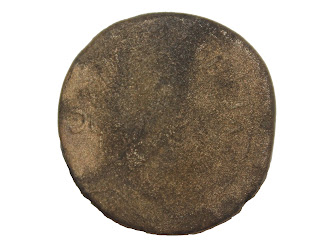 |
| Dupondius of Nerva, obverse (l) and reverse (r) |
Following the assassination of Domitian in 96 CE, Nerva was proclaimed emperor by the Senate. His reign was welcomed by senators, who had previously been persecuted under Domitian’s rule. Nerva openly promised that no senators would be executed during his reign. He also ended trials for crimes of treason, released those imprisoned for treason, and granted amnesty to those who were exiled. When he died, he was the last emperor to be interred in the Mausoleum of Augustus.
Obverse:
The front of the coin depicts Nerva facing right facing
right and wearing a crown of spikes known as a radiate crown.
Inscription:
Imperator Nerva Caesar Augustus Pontifex Maximus,
Tribunicia Potestate, Consul… Pater Patriae.
The first four names refer to Nerva’s regnal name, used during his reign and thereafter. Pontifex Maximus refers to the Republican role of chief high priest, the most important position in Roman religion. It became an imperial title and served as a reference to the religious aspect of the imperial duties. This is followed by “tribune of the people”, a role representing the common people in government. It is sometimes followed by a number to indicate which term as tribune the emperor was serving, but not here. Consul was the highest office under the Republic. During the Empire, it was held by the emperor and his family members. Romans rarely served as Consul more than twice, but the emperor could serve as many times as he wanted. Usually, a number follows to indicate how many times the emperor had been consul and thus when the coin was minted but is illegible here. The final phrase translates to “father of his country”.
 |
| Dupondius of Nerva, reverse |
Reverse:
The back shows Libertas, the personification of liberty,
standing and holding a pileus and a vertical sceptre in each hand. The pileus
is a soft woven wool cap which was often used as a symbol of freedom. They were
sometimes worn by newly freed enslaved people to reflect their newfound liberty,
old men, and the sick. The sceptre is a sign of divinity and associated with
Jupiter, and later served to demonstrate imperial power. The reference to the
imperial ideal of liberty contrasts Nerva’s reign with that of his predecessor
Domitian.
Inscription:
Libertas Publica S.C.
This translates to “public freedom”. S.C. stands for Senatus
Consultus and is commonly found on the reverse of bronze coins issued
before the late 3rd century CE. Unlike gold and silver coins which
were issued under imperial authority, bronze coins were issues under the
Senate’s authority.
Stay tuned to see if you can make heads or tails out of next week's coin!
Eleanor
Collections Assistant

Comments
Post a Comment